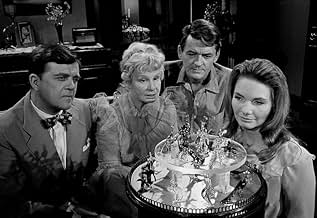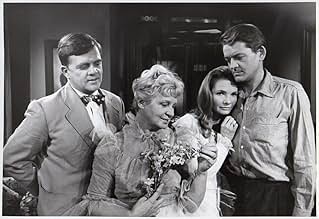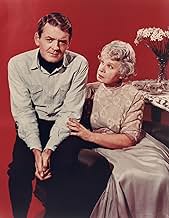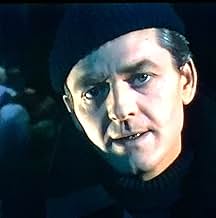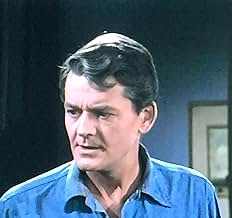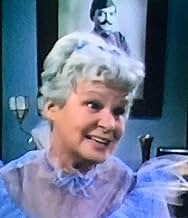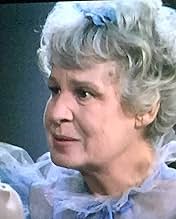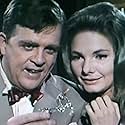Amanda Wingfield dominates her children with faded gentility and exaggerated tales of her Southern belle past.Amanda Wingfield dominates her children with faded gentility and exaggerated tales of her Southern belle past.Amanda Wingfield dominates her children with faded gentility and exaggerated tales of her Southern belle past.
- Nominated for 1 Primetime Emmy
- 1 nomination total
- Director
- Writer
- All cast & crew
- Production, box office & more at IMDbPro
Featured reviews
Those proud but shopworn Wingfields are the subject of a CBS Playhouse production of The Glass Menagerie. And we are fortunate to see Shirley Booth in a classic role as she did not make very many big screen appearances during her long Broadway career. Clearly she favored the stage just like the Lunts and just like the original Amanda Wingfield Laurette Taylor.
Unlike other productions I've seen with Gertrude Lawrence and Katharine Hepburn, Booth is opting for a doughtier version of Amanda than the other two. When Laura who is played here by Barbara Loden asks Booth about the DAR meeting she was supposed to be at, looking at Booth I can't imagine the DAR letting her in the door. In her own way mother is as much in her own world as daughter.
The title refers to the delicate collection of glass figurines that shy and withdrawn Laura is obsessed with. She is also crippled and has withdrawn from the world. The little glass animals are delicate and someone like Laura also delicate completely submerges self into her play world with them.
Like any other mother Booth wants someone, anyone who is a proper gentlemen to take her daughter off her hands. For that she entrusts the task to son Tom who desperately wants to unshackle himself from his dead end warehouse job and see the world and do things. But Hal Holbrook is as much chained to his family as George Bailey is to the town of Bedford Falls. It's also his eyes with which we see all that unfolds.
Completing the quartet in this cast is co-worker of Holbrook's, Pat Hingle. Given Hingle's southern speech pattern I kind of thought that maybe he should have played the son. Still he turns in a nice performance in the least complex of the four roles.
For her role which is the pivotal part of the quartet Shirley Booth got a deserved Emmy nomination. For me with The Glass Menagerie the question is always, is Tom Wingfield making the right life decision in the end. I think those who watch The Glass Menagerie for generations to come will debate that question.
Unlike other productions I've seen with Gertrude Lawrence and Katharine Hepburn, Booth is opting for a doughtier version of Amanda than the other two. When Laura who is played here by Barbara Loden asks Booth about the DAR meeting she was supposed to be at, looking at Booth I can't imagine the DAR letting her in the door. In her own way mother is as much in her own world as daughter.
The title refers to the delicate collection of glass figurines that shy and withdrawn Laura is obsessed with. She is also crippled and has withdrawn from the world. The little glass animals are delicate and someone like Laura also delicate completely submerges self into her play world with them.
Like any other mother Booth wants someone, anyone who is a proper gentlemen to take her daughter off her hands. For that she entrusts the task to son Tom who desperately wants to unshackle himself from his dead end warehouse job and see the world and do things. But Hal Holbrook is as much chained to his family as George Bailey is to the town of Bedford Falls. It's also his eyes with which we see all that unfolds.
Completing the quartet in this cast is co-worker of Holbrook's, Pat Hingle. Given Hingle's southern speech pattern I kind of thought that maybe he should have played the son. Still he turns in a nice performance in the least complex of the four roles.
For her role which is the pivotal part of the quartet Shirley Booth got a deserved Emmy nomination. For me with The Glass Menagerie the question is always, is Tom Wingfield making the right life decision in the end. I think those who watch The Glass Menagerie for generations to come will debate that question.
I've spent 40 years teaching theatre in colleges and universities and I'm teaching The Glass Menagerie tomorrow. This production is still as vivid to me as it was the night I saw it as a college senior in 1966. I had very little interest in plays before watching this--and if one experience can be said to transform a person this did...Pat Hingle's performance was so real and remarkable--all of the confused, sad and empty sincerity of the high school hero who has found how far short life can fall from its promise...I've seen numerous performances of this play since and worked on several of them--but never been as touched, or as changed as by this one.
I came upon this mid-movie on TCM. I've seen the Hepburn and Woodward versions as well as Cherry Jones on stage. This was unwatchable. Shirley Booth, normally a magnificent actress was horribly miscast. She was simply not believable as a faded southern belle. She was incredible in Come Back Little Sheba. In Menagerie, she's simply dreadful.
Hal Holbrook did a respectable job as Tom, and the reliable Pat Hingle did a fine job. Barbara Loden was adequate.
The set conveyed the appropriate claustrophobic atmosphere, but the costumes were far from period. The lime green dress Booth wore? Whose idea was that?
Very disappointed.
Hal Holbrook did a respectable job as Tom, and the reliable Pat Hingle did a fine job. Barbara Loden was adequate.
The set conveyed the appropriate claustrophobic atmosphere, but the costumes were far from period. The lime green dress Booth wore? Whose idea was that?
Very disappointed.
I love Shirley Booth, and I love The Glass Menagerie, but this version of Tennessee Williams's play just isn't very good. It's one of my favorite plays, with both the male and female leads highly coveted as fantastic parts in the theater. When the chemistry between the mother and son is realistic, it's magical. Shirley Booth and Hal Holbrook acted like they'd just met, which is not the chemistry required for this play.
In The Glass Menagerie, an overbearing mother with good intentions wishes her shy, crippled daughter to have male attention, or as she calls it, "gentlemen callers" as she had when she was a debutante. The son works himself raw at the factory to support the family ever since his father left, but he hates wasting his life and is already at his breaking point when the play starts. If the mother and son don't have simmering tension in-between the emotionally high arguments, the play falls flat. For some reason, Hal's timing was incredibly slow. Shirley, who you would think would play the part perfectly, just isn't believable. The mother is written to be a former belle of the ball; she used to have class and live in beautiful surroundings, which is why she wants that experience so much for her daughter. With Shirley, it isn't believable she came from class. She looks at home in her disheveled environment, and she comes across as a nag rather than as a loving mother to her children.
Pat Hingle and Barbara Loden are the bright parts of the televised play. Barbara plays the daughter, a part that's easy to dismiss. She has hardly any lines and instead has to communicate her thoughts using her facial expressions as she practically hides and cowers in the background. Barbara has an incredibly expressive face, and she communicates everything she needs to in order to make her character memorable, understandable, and sympathetic. Pat, who ironically played Barbara's father in Splendor in the Grass in 1961, plays the Gentleman Caller, which is also a difficult part to play. The Gentleman Caller has to be incredibly nice without being flirtatious, and he has to bolster the daughter's confidence without seeming romantically interested in her. Pat masters the lines. He really seems like that guy in high school that's nice to everyone and enjoyed the mandatory leadership workshop so much he continues to spout off the phrases weeks later. If either of these two characters are your favorite in the show, you can rent this version, but I prefer the 1973 adaptation instead.
In The Glass Menagerie, an overbearing mother with good intentions wishes her shy, crippled daughter to have male attention, or as she calls it, "gentlemen callers" as she had when she was a debutante. The son works himself raw at the factory to support the family ever since his father left, but he hates wasting his life and is already at his breaking point when the play starts. If the mother and son don't have simmering tension in-between the emotionally high arguments, the play falls flat. For some reason, Hal's timing was incredibly slow. Shirley, who you would think would play the part perfectly, just isn't believable. The mother is written to be a former belle of the ball; she used to have class and live in beautiful surroundings, which is why she wants that experience so much for her daughter. With Shirley, it isn't believable she came from class. She looks at home in her disheveled environment, and she comes across as a nag rather than as a loving mother to her children.
Pat Hingle and Barbara Loden are the bright parts of the televised play. Barbara plays the daughter, a part that's easy to dismiss. She has hardly any lines and instead has to communicate her thoughts using her facial expressions as she practically hides and cowers in the background. Barbara has an incredibly expressive face, and she communicates everything she needs to in order to make her character memorable, understandable, and sympathetic. Pat, who ironically played Barbara's father in Splendor in the Grass in 1961, plays the Gentleman Caller, which is also a difficult part to play. The Gentleman Caller has to be incredibly nice without being flirtatious, and he has to bolster the daughter's confidence without seeming romantically interested in her. Pat masters the lines. He really seems like that guy in high school that's nice to everyone and enjoyed the mandatory leadership workshop so much he continues to spout off the phrases weeks later. If either of these two characters are your favorite in the show, you can rent this version, but I prefer the 1973 adaptation instead.
Up until I saw this at age 10 or 11, I thought virtually everything I saw on TV was a fantasy that had no connection whatsoever to real life. Seeing The Glass Menagerie for the first time was a shock. Obviously, I can't be sure, but my recollection of the production was that it was perfect (unlike the 70s TV version with Katharine Hepburn and Michael Moriarty). Seeing it started a long involvement for me with theatre and began my search for quality television. It is my #1 "want" to see again; the last time I looked for it at the Museum of Television (several years ago), they didn't even have it. At least it is finally listed here on IMDb, for which I am thankful.
Did you know
- TriviaThe movie was lost for decades. In 2015, the unedited video footage was found and it was reconstructed using an audio recording that a viewer had captured during the broadcast and later uploaded to The Internet Archive. It aired on Turner Classic Movies 50 years from the day of the original telecast.
- ConnectionsVersion of La ménagerie de verre (1950)
Details
- Release date
- Countries of origin
- Language
- Also known as
- CBS Playhouse: The Glass Menagerie
- Production companies
- See more company credits at IMDbPro
Contribute to this page
Suggest an edit or add missing content

